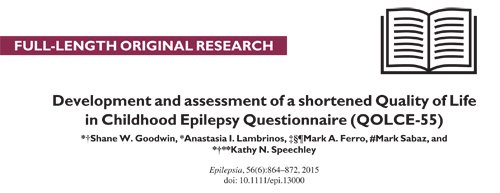
New ARCH Research
A new ARCH Lab paper entitled, “Measurement invariance of the Quality of Life in Childhood Epilepsy Questionnaire (QOLCE-55)” was recently published in Epilepsia. Findings suggested

A new ARCH Lab paper entitled, “Measurement invariance of the Quality of Life in Childhood Epilepsy Questionnaire (QOLCE-55)” was recently published in Epilepsia. Findings suggested

A new ARCH Lab paper entitled, “Measurement Invariance of the WHODAS 2.0 in a Population-Based Sample of Youth” was published in the open-access journal, PLoS

The Quality of Life in Childhood Epilepsy Questionnaire (QOLCE-55) is an epilepsy-specific, parent-reported measure of health-related quality of life of children with epilepsy. Details of

Dr. Ferro recently spoke at the 2015 International Federation for Psychiatric Epidemiology Congress in Bergen, Norway. At the congress, attendees from across the world heard

A new ARCH Lab paper entitled, “Trajectories of Depressive Symptoms in Canadian Emerging Adults” was recently published in the American Journal of Public Health. Findings

A new ARCH Lab paper entitled, “Major depressive disorder, suicidal behaviour, bipolar disorder, and generalised anxiety disorder among emerging adults with and without chronic health

A new ARCH Lab paper entitled, “Mediated moderation of the relation between maternal and adolescent depressive symptoms: role of adolescent physical health” was recently published

A paper by Van Lieshout et al. entitled, “Measurement invariance across parent and self-ratings of extremely low birth weight survivors and normal birth weight controls

A new ARCH Lab paper entitled, “Association between trajectories of maternal depression and subsequent psychological functioning in youth with and without chronic physical illness” was

ARCH Lab research was recently featured in the Neurology Advisor, who interviewed Dr. Ferro about the results from a recent paper, “Risk factors for health-related